Homer: The Odyssey
Book XXIII
Translated by A. S. Kline © Copyright 2004 All Rights Reserved
This work may be freely reproduced, stored and transmitted, electronically or otherwise, for any non-commercial purpose. Conditions and Exceptions apply.
Contents
- Bk XXIII:1-84 Eurycleia tells Penelope the news
- Bk XXIII:85-140 Penelope’s uncertainty
- Bk XXIII:141-204 The Marriage-Bed
- Bk XXIII:205-246 Penelope is convinced
- Bk XXIII:247-299 Odysseus recounts Teiresias’ prophecy
- Bk XXIII:300-372 Odysseus tells Penelope his tale
BkXXIII:1-84 Eurycleia tells Penelope the news
The old woman clambered upstairs, chuckling aloud as she went, to tell her mistress her beloved husband was home. Her knees were working away, though she tottered as she went. She stood at the head of the bed and spoke to her lady, saying: ‘Penelope, dear child, wake and see with your own eyes what you’ve longed for all this time. Odysseus is here, he is home after so many years. He has killed all the proud Suitors who plagued the house, wasted his stores, and bullied his son.’
Then wise Penelope woke and answered: ‘My dear nurse, the gods who can make fools of the wisest, and give insight to the simple-minded, have crazed you and led your wits astray, you who were always so sensible. Why do you mock me, whose heart is full of tears, with this mad tale? You woke me from sleep, sweet sleep that closed my eyelids and wrapped me round. Never have I slept so sound, since Odysseus sailed to Ilium the Evil that it would be better not to name. Go downstairs again, back to the servant’s hall! If any other of my women had woken me to tell me this, I’d have sent her back there with a flea in her ear, but your old age spares you.’
‘Dear child, I wouldn’t mock you,’ faithful Eurycleia replied, ‘it is true, Odysseus is here, he is home, just as I said. He’s the stranger they all insulted in the hall. Telemachus knew long ago he was here, but he managed to keep his father’s plans hidden, till he could revenge himself on those violent and arrogant men.’
At this, Penelope leapt from her bed in joy, and threw her arms about the old woman, with tears springing from her eyes. Then she spoke to her with winged words: ‘Dear Nurse, come now, tell me truly, if it really is him come home as you say: how could he tackle the shameless Suitors single-handedly, with them always crowding in the house in a pack?’
‘I couldn’t see and didn’t ask, but I still heard the groans of dying men,’ loyal Eurycleia replied. ‘We women sat there, terror-stricken, in the furthest depths of our thick-walled quarters, with the doors shut tight, until the moment when your son called to me from the hall, as his father had told him. There I found Odysseus standing over the corpses, lying piled around him on the solid floor. It would have gladdened your heart to see him: all spattered with blood and gore like a lion he was. Now the dead are heaped together at the courtyard gate, and he has had a great fire made, and is purifying our fine house. He sent me to call you, so come with me now, so your hearts may rejoice together, you who have known such suffering. What you long desired has happened at last. He has come home, alive, to his own hearth, to find you and his son here in the palace, and in his own house again he has taken revenge on the Suitors who did him harm.’
But cautious Penelope replied: ‘Dear nurse, don’t exult over them so soon. How welcome the sight of Odysseus here would be to everyone, above all to me and our son, you know. But this tale must be false. Surely one of the gods has killed the noble Suitors in anger, enraged by the depths of their insolence and their wickedness. They showed respect to never a man on this earth whether those they met were good or evil. So now they have suffered for their own foolish excess. Odysseus though has lost his life far away, and with it the chance of his coming home.’
‘My child,’ the loyal nurse replied, ‘what are you saying? That your husband will never return, when he’s here at his own hearth! You never believe a thing! Well, let me tell you of something else that proves it: the scar from the wound the wild boar’s white tusk gave him long ago. I saw it when I washed his feet, and wanted to tell you then, but he clapped his hand over my mouth, and refused to let me speak. Come with me now. I’ll stake my life on it, and if I lie deal me a cruel death.’
‘Dear nurse,’ cautious Penelope replied: ‘wise though you are you cannot fathom the minds of the immortal gods. But, let us go to my son, so I can see the bodies of the Suitors, and the man who killed them.’
BkXXIII:85-140 Penelope’s uncertainty
So saying, she left her room, and went downstairs, considering whether to remain distant, and question the man who was said to be her dear husband, or whether to approach him, clasp his head and hands and kiss them. But when she had crossed the stone sill, she sat down by the far wall in the firelight, opposite Odysseus, while he sat by a tall pillar, his eyes on the ground, waiting to see if his wife would speak as she looked at him. She sat there silently for a long time, wondering, gazing intently at his face: often failing to recognise this man dressed in foul rags. Then it was that Telemachus spoke his criticism of her behaviour: ‘My mother, un-motherly and hard-hearted, why do you distance yourself from my father like this, instead of sitting by his side, plying him with questions? No other woman would steel her heart like this, and sit apart from a husband who had just returned to her and his native land, after twenty years of bitter toil. But your heart is always harder than flint.’
‘My child,’ cautious Penelope answered, ‘my mind is lost in wonder, and I feel powerless to speak and question him, or even look long at his face. But if it is really Odysseus come home, we two have a better way of recognising one another, because there are secret tokens that only the two of us know.’ And noble long-suffering Odysseus smiled at this, and spoke to Telemachus winged words: ‘Telemachus, leave your mother to put me to the proof, in this, her house: she will soon be enlightened. For now, since I’m covered in dust, and dressed in rags, she thinks me unworthy and won’t concede I am Odysseus. But let us consider what to do for the best. Whatever the country, whoever kills even a single man, even one that dead leaves few behind to avenge him, must go into exile, abandoning his native land and kin, while we have killed the noblest youth of Ithaca, the core of its defence. Take thought of that.’
‘Do you take thought, dear father,’ wise Telemachus replied, ‘since they say you are the most resourceful of men, without a mortal equal. We are eager to follow you, and I know we won’t fail to support you to the best of our powers.’
Resourceful Odysseus answered him, saying: ‘Then I’ll tell you the plan that seems best to me. Bathe first, and dress, and order the palace servants to choose fresh clothes. Then let the divine minstrel play us a lively dance on his sweet-toned lyre, so that anyone outside who hears, neighbour or passer-by, will take it for a marriage feast. That way there’ll be no rumour of the Suitors’ deaths put abroad in the town, before we can reach our densely-wooded farm. Once there we can plan to take advantage of whatever the Olympians send us.’
BkXXIII:141-204 The Marriage-Bed
They listened readily to his orders and obeyed. The men bathed and dressed, while the women adorned themselves. The divine minstrel took up his sounding lyre and stirred their desire for sweet music and pleasant dance. The great hall echoed to the footsteps of dancing men, and elegantly dressed women, and hearing the noise outside passers-by said: ‘Ah, surely someone has married our much-wooed Queen. She was too hard-hearted to tend her husband’s great palace to the end, in hopes of his return.’ So they talked, not knowing what was really happening.
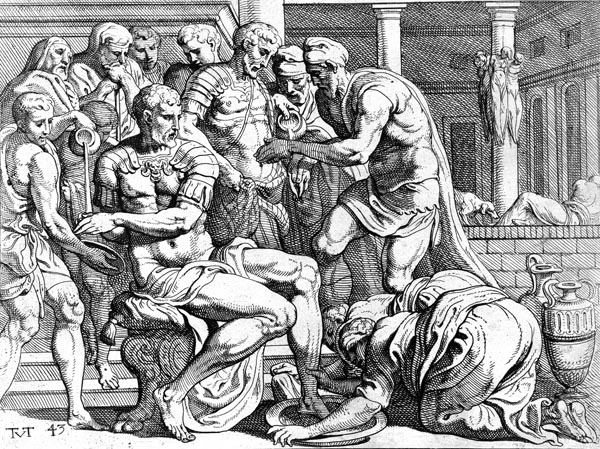
‘Odysseus and Telemachus bathe after killing the suitors’
Meanwhile the housekeeper, Eurynome, bathed great-hearted Odysseus, there in the house, rubbed him with oil, and dressed him in a fine tunic and cloak. Athene then clothed him in beauty, making him seem taller and stronger, and making the locks of his hair spring up thickly like hyacinth petals. As a clever craftsman, taught his art by Hephaestus and Pallas Athene, overlays silver with gold to produce a graceful finish, so the goddess graced his head and shoulders. He left the bath looking like an immortal. Then he returned to the chair, opposite his wife, and spoke to her, saying: ‘Lady, you must have been touched by the Olympian gods: they have given you a harder heart than any other woman, one that nothing can soften. No other woman would steel her heart like this, and sit apart from a husband who had just returned to her and his native land, after twenty years of bitter toil. Come, Eurycleia, make me up a bed to sleep in alone, since my wife’s heart is as hard as iron.’
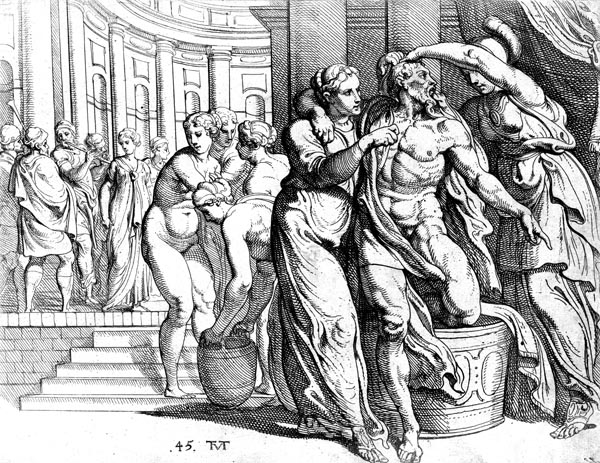
‘Odysseus and Athene in the bath house’
And cautious Penelope answered: ‘Sir, you must have been touched by those same gods. I am not proud and scornful of you, nor am I confused. I know well how you looked when you sailed from Ithaca in your long-oared ship. Come then, Eurycleia, and have the great bed dragged from the fine bridal chamber he built himself, and cover it with rugs and fleeces and brightly coloured blankets.’
These were words to test her husband. But Odysseus, angered, rounded on his loyal wife: ‘Lady, those are truly bitter words you speak. Who has moved my bed? That would be hard, even with the greatest skill, unless perhaps some god arrived who could easily choose to set it down somewhere else. But no mortal man alive however young and strong could easily shift it from its place, since a great secret went into its making, and it was my work and mine alone. A long-leafed olive tree, strong and vigorous, and thick as a pillar, grew in the courtyard. I built my room of solid stone around it, finished it off with a fine roof, and added tight-fitting timber doors. I trimmed the trunk from the roots up, after cutting off all the long-leaved olive branches, smoothed it off skilfully and well, and trued it to the line: that was my bedpost. I drilled holes with the auger, and with this for its beginning fitted all the smooth timbers of my bed until it was complete. I inlaid it with ivory, silver and gold, and stretched shining purple straps of ox-hide across. That was its secret, as I say: but lady, I no longer know if the bed I made is still in place. Perhaps some man has chopped through the olive-trunk, and shifted it elsewhere.’
BkXXIII:205-246 Penelope is convinced
As he spoke, revealing the unchanged truth she knew, her knees gave way and her heart melted. Bursting into tears she ran to Odysseus, flung her arms about his neck, and kissing his face cried: ‘Odysseus, don’t be angry with me, you who in everything were always the most understanding of men. Our sorrows came from the gods, who begrudged our enjoying our youth and reaching old age together. Don’t be angry, or upset, because I didn’t give you this welcome the moment I saw you. My heart was always full of fear that some man would come and cheat me with words. Many men are only out for profit. Helen of Argos, Zeus’ daughter, would never have slept with a stranger from abroad, if she’d known the warrior sons of Achaea would come to fetch her home. A god it was truly that drove her to commit that act of shame: only then did she contemplate the fatal madness that brought us, too, such sorrow. Now you have told me the true secret of our marriage bed, that no other mortal knew but you and I and a single maidservant, Actoris, who was my father’s gift before I came to you, and guarded the door of our fine bridal chamber – Now, you convince my stubborn heart.’
Her words stirred his heart to a greater longing for tears: and he wept, clasping his beloved, loyal wife in his arms. As welcome as the sight of land to the few surviving sailors, who swim to shore escaping the grey breakers, when their solid vessel driven over the sea by wind and towering waves has been shattered by Poseidon, who, saved from drowning, are overjoyed when their brine-caked bodies touch the land: welcome as that was the sight of her husband, as Penelope gazed at him, never unwinding her white arms from round his neck.
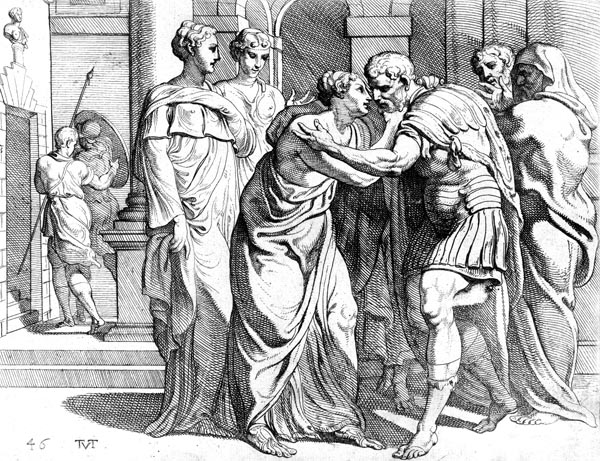
‘Odysseus and Penelope embrace’
Rosy-fingered Dawn would have risen while they wept, if the bright-eyed goddess Athene had not thought otherwise. She held back the long night at its ending, and golden-throned Dawn by Ocean’s stream, not letting her yoke the swift-hoofed horses, Lampus and Phaethon, the colts that draw her chariot, bringing light to men.
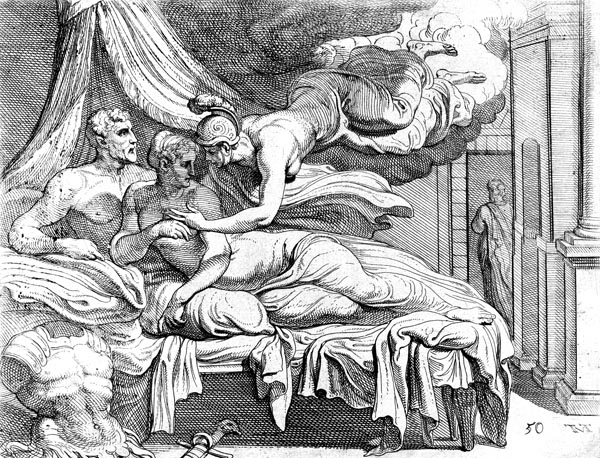
‘Athene assuages Penelope's doubts’
BkXXIII:247-299 Odysseus recounts Teiresias’ prophecy
Resourceful Odysseus said to his wife at last: ‘Dear wife, we have not yet reached the end of our troubles. I still have a long hard labour to perform before I reach my end: or so the spirit of Teiresias prophesied when I descended to Hades’ House to ask how my comrades and I might return home. But come to bed now, wife, so we may delight in rest, soothed by sweet sleep.’
‘Your bed is ready for you whenever you wish,’ wise Penelope answered, ‘now the gods have brought you home to your own country and this fine house. But since a god has put the thought in your mind, tell me about this fresh trial, since I’ll only learn of it later, and it is better to know now.’
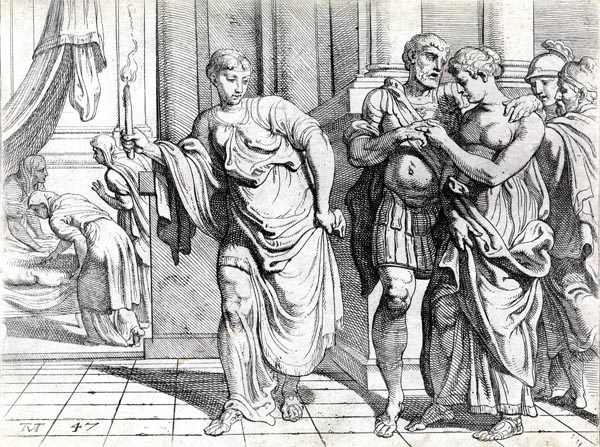
‘Odysseus and Penelope on their way to bed’
‘Lady, the gods have touched your mind,’ resourceful Odysseus said, ‘why be so eager to know? Still, I will tell you, hiding nothing, though your heart will gain no pleasure from it, and nor does mine. Teiresias told me to travel through many cities of men, carrying a shapely oar, till I come to a race that knows nothing of the sea, that eat no salt with their food, and have never heard of crimson-painted ships, or the well-shaped oars that serve as wings. And he gave me this as a sign, one I could not miss, and now I tell it you. When I meet another traveller who says that I carry a winnowing-fan on my broad shoulder, there I must plant my shapely oar in the ground, and make rich sacrifice to Lord Poseidon, a ram, a bull, and a breeding-boar. Then leave for home, and make sacred offerings there to the deathless gods who hold the wide heavens, to all of them, and in their due order.
And death will come to me far from the sea, the gentlest of deaths, taking me when I am bowed with comfortable old age, and my people prosperous about me. All this he said would come true.”
‘If the gods really intend a more pleasant old age for you,’ said wise Penelope, ‘there is hope this will set an end to all your troubles.’
So they conversed, and as they spoke Eurynome and the nurse made up their bed with soft bedclothes, by the light of a blazing torch. When the two servants had fussed over the coverings of the great bed, the old nurse returned to her room to sleep, and Eurynome the chambermaid lit them on their way, and took her leave of them in the bridal chamber. Joyfully they re-enacted the rites of their own familiar bed. And Telemachus, and the cowherd and swineherd, stilled their dancing feet, dismissed the women, and lay down to sleep themselves in the darkened hall.
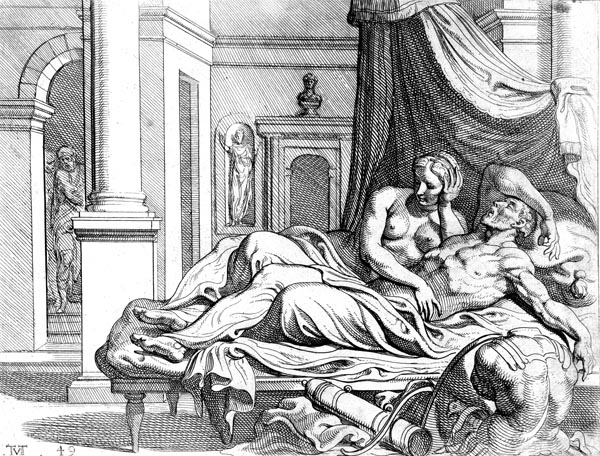
‘Odysseus and Penelope are reunited’
BkXXIII:300-372 Odysseus tells Penelope his tale
When Odysseus and Penelope had their fill of love’s joys, they took comfort in telling each other their tale. The lovely Queen told him all she had suffered at home, watching the detestable crowd of Suitors, who on her account slaughtered many cattle and fat sheep, and emptied whole jars of wine. And Odysseus, scion of Zeus, told her of all the pains he had endured in his labours, and all the pain he had inflicted on men, and she loved to hear it all, and sweet sleep failed to drown her eyelids until his tale was done.
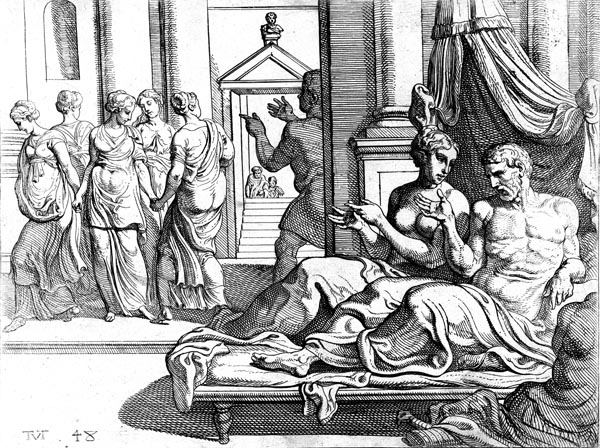
‘Odysseus tells Penelope of his adventures’
First he told of his victory over the Cicones: and how he came to the fertile Land of the Lotus-Eaters: and of what the Cyclops did, and how he had made him pay the price for those brave comrades who were eaten without pity. Then he told of Aeolus’ friendly welcome and how he had seen him on his way, but, not being destined to reach his dear homeland yet, how the gale took him and drove him, groaning aloud, over the teeming sea. How he came to Telepylus next, where the Laestrygonians destroyed all his ships and his fighting men, and how his was the only vessel to escape.
He told her about Circe’s cunning, and her wiles: and how he had gone to the dank Halls of Hades to consult the spirit of Theban Teiresias, and had seen his comrades again, and the mother who had borne him and nursed him as a child. Then of the Sirens’ voices, and their endless singing: how he had passed the Wandering Rocks, dread Charybdis and Scylla whom no ship passed by unscathed. Then how his crew had slaughtered the cattle of the Sun, and how Zeus the mighty Thunderer struck his swift ship with a fiery lightning bolt, so that his noble comrades died together, though he alone escaped their dreadful fate.
Then he told how he came to Ogygia, the Nymph Calypso’s isle, and how she longed for him to wed her and imprisoned him in her echoing cave, and cared for him and swore to make him ageless and immortal, though she could never touch his heart: and how after many trials he came to the Phaeacians, who honoured him readily like a god, and sent him home in their ship to his beloved island, after giving him piles of gold and bronze and fabrics. He had reached the end of his tale when sweet sleep came to him, relaxing his limbs, and soothing the cares of his heart.
Now another thought occurred to the goddess, bright-eyed Athene. When she considered Odysseus had filled his heart enough with the joys of love and sleep in his wife’s arms, she roused golden-throned Dawn from Ocean’s stream, to bring light to the world. Then Odysseus rose from his soft bed and gave his wife his orders, saying: ‘Wife we have had enough of trouble, you and I: you, weeping here over the many sufferings caused by my long journey home, and I, caught in a net of sorrow by Zeus and the other gods, far from my own country, and longing to return. But now we are back together in our own wished-for bed, you must take care of my wealth here in the palace, while I will seize flocks to replace those the Suitors consumed, and the Achaeans will give me the rest till the folds are full. I must go now to our wooded farm to find my good father, who is suffering because of me. And I ask this of you, dear wife, knowing your wisdom. When the sun is up, rumours of the Suitors’ deaths in the palace will be rife. So go to your room upstairs with your maids, and stay there: don’t see anyone and ask no questions.’
So saying, he clad his shoulders with fine armour, and roused Telemachus, and the cowherd and swineherd, and told them to take their weapons in their hands. They obeyed, donning bronze armour, and opening the doors followed Odysseus outside. Light flooded the earth, but Athene hid them in darkness, and soon led them clear of the town.
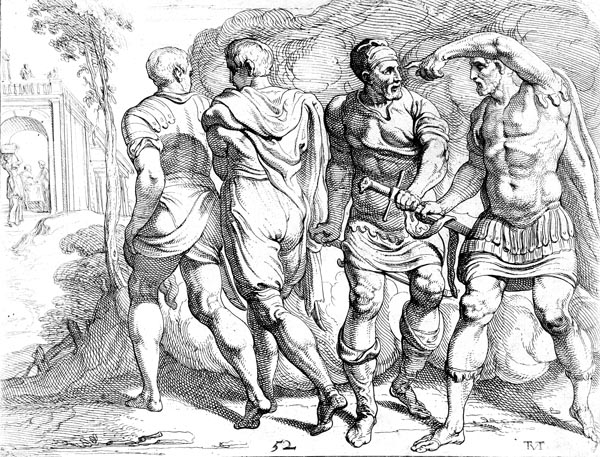
‘Odysseus arms his companions on their way to Laertes’